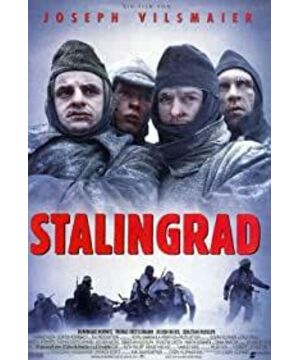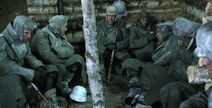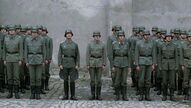History is undoubtedly written by the victors. If we only discuss the Battle of Stalingrad, we use the Soviet perspective to describe and show that although it is tragic but follows the trend, this war is a victory forged by their blood. From 1949, 1974 to 1989, 2013, from the Soviet Union to Russia, the Battle of Stalingrad was brought to the big screen as a war drama many times. Battle of Le. From the defeated country to do the opposite, writing Stalingrad from the perspective of the German army has a unique reflection in the eyes of the world audience as bystanders.
All World War II films are about anti-war themes, the beginning of losing everything in the face of Nazi Germany - the Battle of Stalingrad, in Germany, a country rich in philosophers, the director Joseph Wiersmaier who experienced World War II himself in his childhood His reflection is undoubtedly profound, and he is so rational and even cold that he does not leave any hope in the film. For German soldiers, death was the fateful end in the battle of Stalingrad, and returning home alive was a false fantasy of too young too simple. Because of this, the director chose a uniquely conceived downhill abnormal narrative structure in the World War II film, and finally ended in despair that the white land was really clean.
In "Battle of Stalingrad", there is no climax of the decisive battle that the audience has been waiting for for a long time. The battle of bullets only exists for the first half an hour. After the war, they felt the cloud of death and the deep quagmire. Different from the heroism of "not giving up any soldier" in the American World War II film "Saving Private Ryan", there is absolutely no heroism in this film, and living is the instinct of people during the war. Unfortunately, none of the protagonists walked out of the Siberian Icefield... The last two soldiers froze to death on the white ice in the warmth of the fantasy of returning home. The film restores the true fate of the German soldiers in the unprecedented defeat of Stalingrad. The death of freezing and starvation is far greater than the death of the battle. The cold and lonely snow covers all the once hot lives. This is war.
Compared with the attitude of Japanese soldiers to seeing Chinese women in "The Thirteen Hairpins of Jinling" and "Nanjing Nanjing", in this film, after the Soviet woman was found tied to an iron bed, the treatment of German soldiers and officers was considered humane. , which implies the bottom line of a proud nation.
View more about Stalingrad reviews











